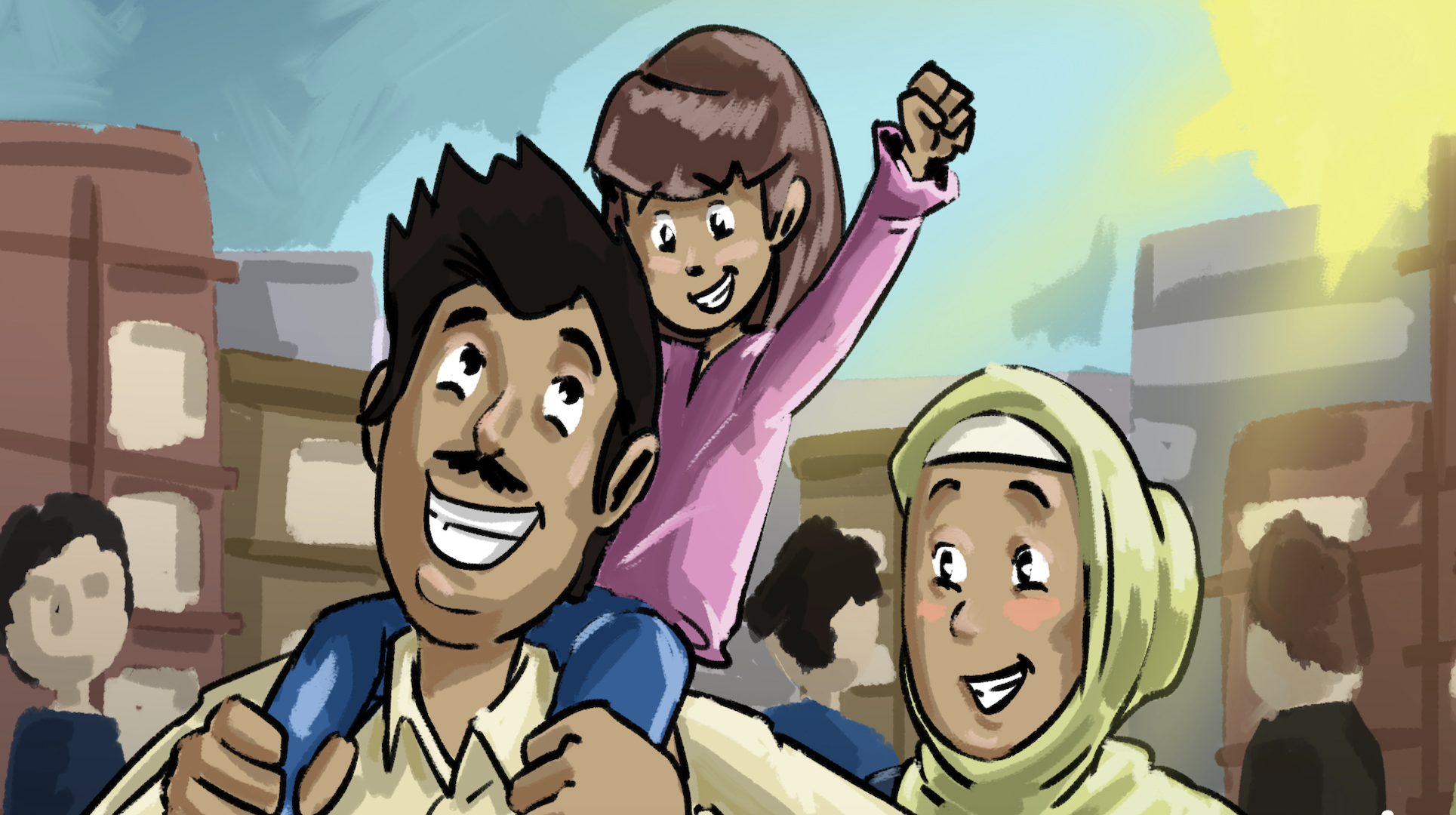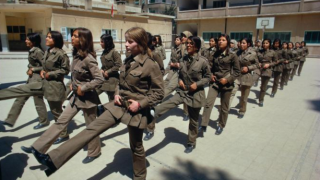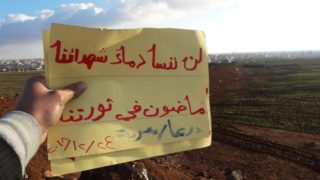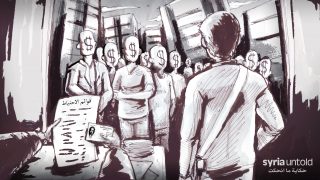Suwayda, the Druze-majority province in southern Syria, has enjoyed a semblance of independence for decades.
Under consecutive French, Ba’athist and Assadist rulers in Syria, Suwayda both launched successive rebellions and maintained local institutions—unlike other areas of the country.
But since the beginning of Syria’s 2011 uprising and ensuing conflict, the Druze-majority region has come under increasing pressure.
Facing opposition and Islamist forces around the country, the Syrian government has doubled-down on pre-war legislation for compulsory military service in order to support its war effort.
Suwayda has suffered its own problems, including a major attack by the so-called Islamic State (IS) group in mid-2018, when IS militants stormed Druze villages and killed hundreds of civilians.
Throughout the war, young men in the province have stood out by not integrating into the military. By law, almost all men between the ages of 18 and 42 must serve in the Syrian military—although there are exceptions. But in contrast to many government-held areas of Syria, in Suwayda province most young men haven’t gone into military service. In fact, some have even actively opposed it.
There are risks. Draft dodgers can find it difficult to access official documents, and live in constant fear of the authorities. Much like in the days of the Safar Barlik—the Arabic name for the campaign of enforced conscriptions and displacements that were imposed on Levantine communities in the dying days of the Ottoman Empire—compulsory military service has wasted away communities for years now.
Wissam, 34, figured on the reserve list a few years ago. He refused to leave his home in Jaramana, a southeastern suburb of Damascus, in case he was picked up for military service and taken away.
“Five years of [self-imposed] house arrest...had me living in constant fear," he tells Syria Untold.
"I would have recurring nightmares and would always move around carefully. I couldn't go to cafes, or visit friends and family."
‘I was trapped’
This reality has driven many young men who refused to sign up for conscription to leave the country altogether. Those who stayed behind, like Wissam, live with constant fear and anxiety.
At one point in the past few years, reserve drafts were being updated on an almost daily basis. The number of people listed for military service reached a million in Syria, according to reports.
More recently, the Syrian government has given some indications that it will relax the policy.
Mouannes, also 34, returned to Syria after more than three years living in the Gulf because he'd heard the Syrian government had issued an amnesty for draft dodgers or those who hadn't completed their military service.
But now he feels it was a trap.
“During the years I spent abroad, I always dreamed of visiting my friends and family, my hometown. So I was so happy when I heard about the decree," he says.
“I packed my bags and flew home. But that happiness would only last a week.”
After going home, Muannas got a call from the town's police station informing his family that his name had been put on a reserve list for military service.
"I lost my job, residence permit and my visa [to the Gulf]," he explains. "I was trapped. I found myself drowning in regret every day after having lived a comfortable life abroad.”
Sheikh Wahid al-Balous, the former head of the prominent Suwayda-based Druze faction the Rijal al-Karama (Men of Dignity), supported people like Muannas in the province under threat of enforced conscription.
Al-Balous was killed in a mysterious car bomb attack in September 2015 that many blamed on the Syrian government, after the local sheikh became increasingly critical of regime policy in Suwayda and Syria more broadly.
Still, the movement has continued to protect those unwilling to sign up with the Syrian army.
On several occasions, Rijal al-Karama members have intervened on behalf of—and actually freed—men arrested in order to conscript with the army.
As a result, the number of pro-government checkpoints inside the province decreased, posing less of a threat, meaning that Suwayda has remained until now something of a safe haven for young men hoping to avoid military conscription.
Although they are unable to leave, they do enjoy security and some freedom of movement internally. Local factions do not allow any checkpoint that could be a potential risk to young men.
For this reason, Suwayda has reportedly become a refuge for some 50,000 young men escaping conscription in recent years.
‘This reality has left me with few options’
For some in Syria these days, the immediate threat of war is over. Many former rebel-held territories have been retaken by the government, and officials in Damascus regularly trumpet a narrative that the country is now moving towards some form of peace. Suwayda is no different.
Wadih is a 32-year-old originally from the southern Syrian province.
“My family travels to Lebanon every month, and my friends go to Damascus whenever they want. They go to the beach every now and then and visit different areas of Syria,” he tells Syria Untold.
But not everyone can enjoy this life. Wadih evaded military service when he was called up in 2013. He cannot move around.
“I have to stay in the same place that I haven’t left for six years. My whole life reached a halt.”
“My dreams are dead,” he says. “I am a prisoner to routine in my village. There is no social life, no job opportunities.”
Others in Suwayda describe similar experiences—that by dodging their military service, their lives were immediately put on hold. Hopes for a university degree were quashed, perhaps the hope of finding a good job in spite of the war raging around them.
Bassel, now 31, says that when his name reappeared for reserve service, “[it] killed my dream of graduating” from university.
“I received the call for conscription end of 2015. I was in my fourth year, and I could not go to Damascus to sit for the exams.”
“All the hard work I’d put into my studies just went down the drain,” he adds.
Given the lack of work in this historically poor province, many families in Suwayda rely on remittances and support from relatives working in Lebanon, the Gulf, Venezuela and beyond—it’s often the sons of the families doing the work there. Most young men travel once they are done with compulsory military service or after graduating so that they can earn a living and build their future.
But with many young men now effectively trapped inside the province as they attempt to evade military service, the Syrian government’s conscription drive is having an adverse impact on the local economy in Suwayda.
Yamen, 35, had been working in Lebanon for about five years when be was called up.
“I used to earn around $1,000, but now I barely make 130,” he explains.
Now working as a cab driver, having bought the car with his old earnings from Lebanon, Yamen’s options are limited.
“I was trying to save money to open up a shop for me and my brothers, but the reality here left me with few options.”
Wassim, in his 30s, was getting ready to travel to Qatar—where his elder brother lives—when he got word that he’d been called up for reserve service.
“Since then, I haven’t moved,” he says.
Unable to find a fixed job, he works odd jobs in farming or construction.
“Were it not for the transfers my brother sends from Qatar, I would not have been able to afford my daily expenses—especially since there are no job opportunities within the province,” Wassim adds.
The military service amnesty: A ‘trap?’
Late last year, the Syrian government issued an amnesty decree for draft dodgers. There were hopes that the decree would mean there’d be no charges against those who avoided reserve military service, that their names would simply disappear from the much-feared list of names kept at border posts and checkpoints across the country.
It wasn’t to be. Just a few days after the decree was issued, reserve lists were reinstated—including old names as well as new ones—shattering whatever hopes had existed among the young men of Suwayda for freedom of movement, study and work.
Many now regard the amnesty decree as little more than a trap. Some defectors even returned from neighbouring countries, only to be disappeared and never heard from again. The risks for anyone returning to Syria are still largely unknown.
Shadi was ready to do it, though.
“After the amnesty decree, life seemed possible again,” the 37-year-old says.
Upon hearing the news, he’d applied for a travel permission as well as a new passport. When he went to collect the passport, the officer told him he’d have to wait until the new reserve lists were published.
“When I checked with them, I was surprised to find out that my name was there again on the lists. Now the approval has been revoked. I was also unable to get a refund of the amount I payed to receive the travel clearance.”
Shadi’s story reflects the reality for young men living across Syria—not just in Suwayda province.
“I was first listed for military service when I was 30, and now I’m 37,” he says. “My youth has gone.”
“Now I just think to myself every day: will life ever go back to normal again? If so, when?”
A version of this article was originally published in Arabic here.







